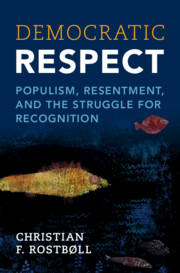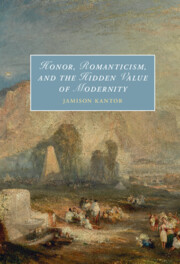Refine search
Actions for selected content:
49 results
Chapter 13 - Kant’s Retributive Turn
-
-
- Book:
- Kant's Lectures on Political Philosophy
- Published online:
- 18 July 2025
- Print publication:
- 07 August 2025, pp 238-255
-
- Chapter
- Export citation
3 - The Honors of War in Early Modern Surrender, 1650–1789
-
- Book:
- Leaving the Fight
- Published online:
- 01 March 2025
- Print publication:
- 06 February 2025, pp 67-104
-
- Chapter
- Export citation
Conclusion: Power, Authority, Influence, and Service
-
- Book:
- Ladies-in-Waiting in Medieval England
- Published online:
- 02 January 2025
- Print publication:
- 09 January 2025, pp 284-287
-
- Chapter
- Export citation
Chapter 2 - A Theory of Glory
- from Part I - Glory
-
- Book:
- Glory, Humiliation, and the Drive to War
- Published online:
- 19 December 2024
- Print publication:
- 02 January 2025, pp 31-53
-
- Chapter
- Export citation
4 - Other Liberties
- from Part I - Liberty and Liberties
-
- Book:
- Remaking the World
- Published online:
- 29 November 2024
- Print publication:
- 19 December 2024, pp 61-92
-
- Chapter
- Export citation
French Law, Danish Cartoons, and the Anthropology of Free Speech
-
- Journal:
- Comparative Studies in Society and History / Volume 67 / Issue 1 / January 2025
- Published online by Cambridge University Press:
- 10 December 2024, pp. 5-32
-
- Article
-
- You have access
- Open access
- HTML
- Export citation
3 - The Culture of the Bar
-
- Book:
- Brotherhood of Barristers
- Published online:
- 11 April 2024
- Print publication:
- 18 April 2024, pp 52-89
-
- Chapter
- Export citation
What Shaming Reveals: Examining Qatar’s Response to Being Shamed as the Host of the 2022 FIFA Men’s World Cup
-
- Journal:
- German Law Journal / Volume 24 / Issue 9 / December 2023
- Published online by Cambridge University Press:
- 19 March 2024, pp. 1681-1690
-
- Article
-
- You have access
- Open access
- HTML
- Export citation
7 - Tocqueville’s Machiavellianism
- from Part II - Machiavelli’s Fortuna
-
- Book:
- Machiavelli's Effectual Truth
- Published online:
- 07 September 2023
- Print publication:
- 21 September 2023, pp 247-258
-
- Chapter
- Export citation
2 - Lesser Angels
-
- Book:
- Right and Wronged in International Relations
- Published online:
- 29 July 2023
- Print publication:
- 10 August 2023, pp 31-64
-
- Chapter
- Export citation
4 - The Lamb as Royal Benefactor
-
- Book:
- Royal Ideologies in the Book of Revelation
- Published online:
- 22 June 2023
- Print publication:
- 06 July 2023, pp 105-147
-
- Chapter
- Export citation
5 - Praising God’s Chosen King
-
- Book:
- Royal Ideologies in the Book of Revelation
- Published online:
- 22 June 2023
- Print publication:
- 06 July 2023, pp 148-183
-
- Chapter
- Export citation
4 - The Lamb as Royal Benefactor
-
- Book:
- Royal Ideologies in the Book of Revelation
- Published online:
- 22 June 2023
- Print publication:
- 06 July 2023, pp 105-147
-
- Chapter
- Export citation
5 - Praising God’s Chosen King
-
- Book:
- Royal Ideologies in the Book of Revelation
- Published online:
- 22 June 2023
- Print publication:
- 06 July 2023, pp 148-183
-
- Chapter
- Export citation
Hair and Hat Ritual Shaming Punishments in Nineteenth-Century Iran
-
- Journal:
- Iranian Studies / Volume 56 / Issue 4 / October 2023
- Published online by Cambridge University Press:
- 28 June 2023, pp. 749-771
- Print publication:
- October 2023
-
- Article
-
- You have access
- Open access
- HTML
- Export citation
2 - Respect, Esteem, and Solidarity
-
- Book:
- Democratic Respect
- Published online:
- 16 March 2023
- Print publication:
- 23 March 2023, pp 49-86
-
- Chapter
- Export citation

Democratic Respect
- Populism, Resentment, and the Struggle for Recognition
-
- Published online:
- 16 March 2023
- Print publication:
- 23 March 2023
12 - Motive: Honor
- from Part IV - Characters
-
- Book:
- Death in Old Mexico
- Published online:
- 02 March 2023
- Print publication:
- 09 March 2023, pp 118-134
-
- Chapter
- Export citation

Honor, Romanticism, and the Hidden Value of Modernity
-
- Published online:
- 23 February 2023
- Print publication:
- 19 January 2023
Introduction
-
- Book:
- Honor, Romanticism, and the Hidden Value of Modernity
- Published online:
- 23 February 2023
- Print publication:
- 19 January 2023, pp 1-23
-
- Chapter
- Export citation
